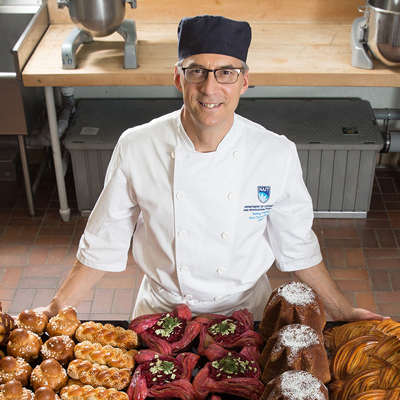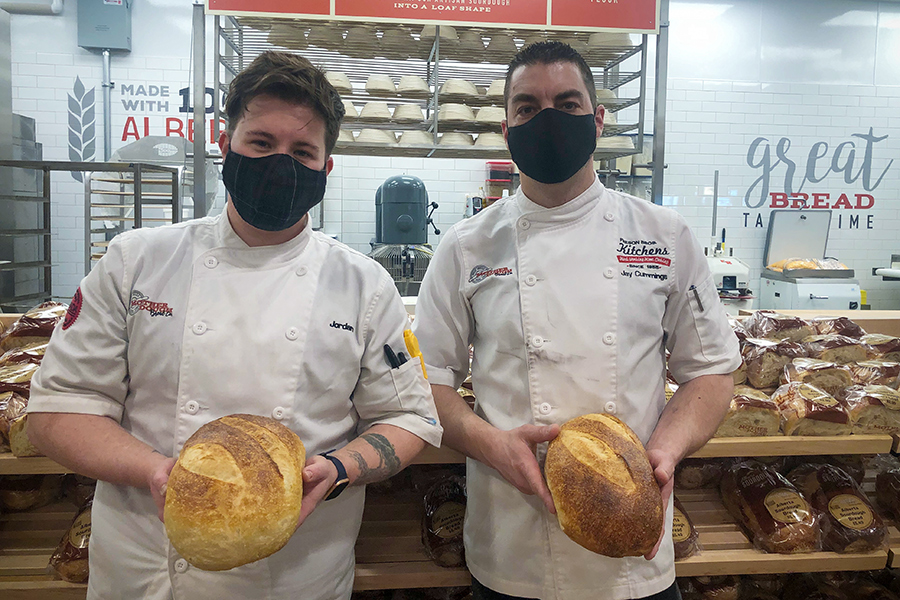Baking program chair guided the transition
When Jay Cummings interviewed for the position of bakery director at Freson Bros. in 2015, he was asked what he would do differently if hired.
Cummings’ response was simple: “I would bring baking back.”
This wasn’t a shot at Freson Bros., the Alberta-based grocery chain, but rather a comment on the entire supermarket industry, which for decades had focused on convenience and the lowest possible prices in their bakeries – often at the expense of quality. Cummings, a trained baker in his own right, had seen this trade-off firsthand in his years working at a rival chain, where volume was key.
“I’m making 5,000 loaves of bread an hour with our machines,” he told his interviewers. “There’s no way you can compete with that.”
Cummings wanted to dramatically revamp the way grocery stores bake bread.
Instead, Cummings wanted to dramatically revamp the way grocery stores bake bread. He wanted to return to traditional, long-fermented products that weren’t pumped full of preservatives to keep them on the shelf for weeks at a time.
In other words, he wanted everything Freson Bros. made to be made out of all-natural sourdough.
Cummings’ sales pitch worked. He was hired, and given the green light on his vision. But to actually implement that vision, he would need to re-train the bakers at every Freson Bros. location, more than a dozen spread across smaller markets around the province, (including their newest store in Edmonton, which opened earlier this year).
So Cummings made a phone call to NAIT, and to Alan Dumonceaux.
A crash course in sourdough
Dumonceaux (Baking ’05) is the chair of NAIT’s Baking and Pastry Arts program, as well as a world-renowned baker who once competed in Paris’s prestigious Coupe de Monde de la Boulangerie and Masters de la Boulangerie competitions. When he got the call from Cummings, Dumonceaux invited all of the Freson Bros. baking managers out to NAIT’s state-of-the-art training facility for a crash course in sourdough.
“North America grew up on Wonderbread,” Dumonceaux says. “Consumers are going through an education now, over the last 20 years, that a really white crumb is actually an indication of poorer quality bread.”
 Ironically, he says, even the “sourdough” variety that most people have bought from grocery stores isn’t the real deal – it contains extra acids, improvers and other additives that artificially flavour the bread and speed up the baking process.
Ironically, he says, even the “sourdough” variety that most people have bought from grocery stores isn’t the real deal – it contains extra acids, improvers and other additives that artificially flavour the bread and speed up the baking process.
The sourdough Dumonceaux taught the Freson managers to make, on the other hand, used a longer, more handmade, and more natural fermentation process that humans have made use of for millennia.
Unlike regular white bread, sourdough contains bacteria that produce lactic acid, which gives the bread its distinctive flavour.
The process also modifies gluten in a way that makes it far easier to digest. Natural sourdough is also surprisingly adaptable, able to be used in everything from cinnamon buns to pizza dough, as it is at Freson Bros. bakeries.
“They’ve been doing exceptionally well with it.”
Soon after Cummings was hired, Freson managers learned how to make their own sourdough starters, and went home with a variety of bread products to try. After some more intense practice, they started implementing the sourdough program at their own stores, and came back to NAIT the following year for some additional training under Dumonceaux.
Over time, the entire chain made the switch to all sourdough, all the time. Their teacher couldn’t be prouder of how it’s turned out.
“They’ve been doing exceptionally well with it,” Dumonceaux says.
Flying off the shelves
Today, six years into the job, Cummings’ vision is complete. Every bread product at every single Freson Bros. location now contains sourdough. Customers around the province have noticed the difference, too – and none more fervently than those at the chain’s first-ever store in Edmonton, which opened at Rabbit Hill Road on March 5.
Not even Cummings could have predicted the level of demand for the goodies coming out of the Edmonton bakery. Back where he used to work, he says, bread might have peaked at number 150; at Freson Bros., their sourdough bread is the second-most popular item in the entire store.
“We’re beating things like bananas and chicken breasts,” he says. “This is unheard of.”

Jordan King, bakery manager of the Edmonton location, is just as impressed with the response. A NAIT grad himself (Baker ’16), he relishes the opportunity to use the skills he learned at school, which included his own sourdough seminars with Dumonceaux.
“But it’s also the pride that goes into my work,” says King. “I constantly think about sourdough. I’m always thinking about how we can make it better.”
“I constantly think about sourdough. I’m always thinking about how we can make it better.”
Since the success of their sourdough collaboration, Freson Bros. and NAIT have expanded their connection. Since 2019, they’ve also joined together for a series of showcase nights at Ernest’s, NAIT’s on-campus restaurant, where teams of student bakers, butchers and chefs compete to make the best menus on the spot for a roomful of judges (the pandemic saw the 2021 competition put on hold). As part of the event, Freson Bros. donates $14,000 per year towards student scholarships.
“It’s a real win-win relationship,” says Dumonceaux.
A starter named Charlie
You could say that Jay Cummings and Alan Dumonceaux are responsible for the sourdough program at Freson Bros. Alberta grocery chain but, really, Charlie started it all.
Charlie is the original sourdough starter – that thick mixture of flour, water and naturally occurring yeast and bacteria – that was propagated into what’s used to make hundreds of loaves, buns, treats, and even waffles and pancakes each day at more than a dozen Freson locations across the province. It’s fed with fresh flour and water twice daily.
Depending on the item, bread products at Freson Bros. can take 24 to 48 hours to ferment and proof before baking. At the Edmonton store, 14 bakers work three shifts to ensure that the supply doesn’t run dry.
Running an artisanal bread operation at mass-production scale requires hundreds of pounds of healthy starter. Even though each store maintains its mother dough, Cummings keeps Charlie the First in a jar in his refrigerator at home, just in case.
– techlifetoday staff